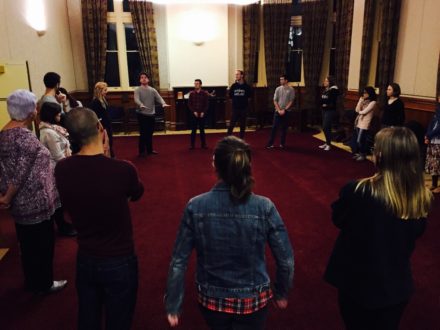The Australian Science Communicators is proud to offer the Unsung Hero Award of Australian Science Communication
The award will be announced at the ASC Conference in Melbourne in February 2020.
Nominations close at 5pm on Friday 31 January 2020.
ASC Unsung Hero Award 2019 Nomination Form – Entry WORD
ASC Unsung Hero Award 2019 Nomination Form – Entry PDF
The Unsung Hero of Australian Science Communication is an initiative of the Australian Science Communicators.
Previous recipients are Kylie Andrews (2017) Kylie Walker (2015), Frankie Lee (2014) and Craig Cormick (2013). The award was launched by the 2011 National Executive and realigned from the previous ‘Unsung Hero of Science’ award (read some background here).
Criteria
The criteria for nomination for the Unsung Hero Australian Science Communication are:
- Nominees (an individual or group) must be resident in Australia and actively engaged in science communication, interpreted broadly to include, but not limited to, pursuits such as:
- teaching,
- research,
- broadcasting,
- script and book writing,
- science and policy,
- science shows,
- science promotion and
- interpretation of science within cultural institutions.
- The work the nominee is being nominated for must have been carried out in Australia.
- Nominees should have not yet received significant recognition for their contribution to science and its promotion. This will almost certainly rule out a ‘top’ or popular science communicator. The nominee should have shown that they regard science communication as an integral part of scientific work.
- Nominees should have a considerable or prolonged record (at least several years) in science communication.
- The award is intended to recognise those whose contribution has been so significant over a period of time that they should by now have been recognised. It is unlikely that this would apply to a candidate whose contribution, however significant, is of short duration.
- Nominators must give careful consideration to what counts as ‘science’ – for example, nominees from technological or environmental fields should be nominated not just on the basis of their contribution to those particular fields, but because the scientific side of their work is strong and their communication contributes to a better understanding of the process and practice of science.
Notes:
This award may be made to a candidate whose work is specifically in science education, promotion or communication in one or many fields where the science component of their work is highly significant.
Benefits of the award
Ideally, the award may assist the recipient in their work, for example by publicising a difficult issue or by recognising that they have been a ‘lone and unpopular voice’ in spite of their scientific achievements being strong.
The award may also help a recipient to focus attention on their efforts or give them greater credibility and help them overcome adverse or unfair criticism.
Selection Process
Selection is based solely on the written information provided on the nomination form.
A selection committee of representatives from the Australian Science Communicators will assess all nominations and determine award recipients.
In some instances the selection committee may request further information before making their final decision.
The Australian Science Communicators reserves the right to make no awards should the judges consider that the quality of candidates does not warrant awards, or should the nominated candidate(s) not satisfy the selection criteria.
Requirements for Award Nomination
The nominator must be a financial member of the ASC, but the nominee need not be a member. The nominator should first consult with the nominee and referees to ensure the nominee is aware of, and gives consent, to the application.
Each nomination must comprise a fully completed award nomination form. Preferable length: 2 pages.
Nominations close at 5pm on Friday 31 January 2020.
Nomination enquiries to:
Lisa Bailey
President of the Australian Science Communicatorspresident@asc.asn.au
Send completed nominations to:
Kali Madden
Executive Officer – Australian Science Communicators
office@asc.asn.au
Nomination forms
Nominations close at 5pm on Friday 31 January 2020.
ASC Unsung Hero Award 2019 Nomination Form – Entry WORD
ASC Unsung Hero Award 2019 Nomination Form – Entry PDF

